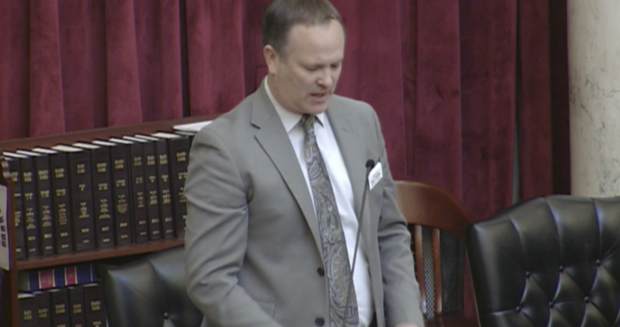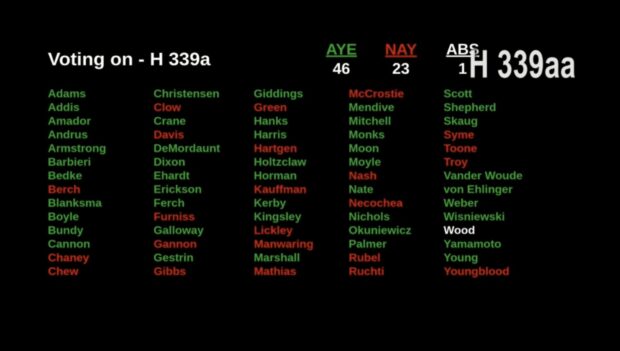The logjam over state budgets — and especially education budgets — escalated to a higher level Wednesday.
In a less-than-subtle rebuke of the House, the Senate wrapped up its floor session late Wednesday morning, and said it won’t reconvene until next week.
On Wednesday, senators said they cannot address tax relief and transportation funding bills before they have a clearer picture of the state budget picture — which means they want the House to work through its concerns about budget bills.
“We first need to know what we’re dealing with,” said Senate Majority Leader Kelly Anthon, R-Burley. “We cannot move forward.”
The House Tuesday killed a $1.1 billion K-12 budget, covering teacher salaries, as conservatives said they wanted safeguards to ensure public schools do not address critical race theory and social justice programs. Citing

similar concerns, the House last week killed a higher education budget bill that would have earmarked $315 million in state general fund tax dollars.
Taken together, these two spending bills alone account for about one third of the state general fund.
The Joint Finance-Appropriations Committee will have to rewrite both of these budgets. The committee will meet Thursday morning, Senate committee Chairman Steve Bair, R-Blackfoot, said Wednesday. The committee has not yet posted a Thursday agenda.
The Senate did polish off a few bills Wednesday before calling it a week — including a State Board of Education budget bill earmarking $8.6 million in general fund dollars for the board’s office operations. That bill passed 31-4, and still has to go to the House.
The Senate left a couple of huge end-of-session bills on its calendar. House Bill 332, a far-reaching $389.4 million tax relief bill waits on the Senate’s amending order. But the Senate hasn’t yet amended the bill. House Bill 362, an $80 million-plus transportation funding bill, waits on the Senate’s third-reading calendar. In theory, the Senate could vote on that bill upon its return Monday.
College free speech bill heads to House floor
The House Education Committee Wednesday moved a bill forward dealing with free speech on college campuses.
House Bill 364, called the “Protecting Critical Thinking in Higher Education Act,” is meant to make “clear that our students, particularly in our public institutions of higher education, are allowed and can continue to have their ability to practice their First Amendment rights,” said Rep. Barbara Ehardt, R-Idaho Falls, who pushed the proposal.
The bill would require public colleges and universities to post an annual report on their website outlining their compliance with new free speech codes. Students could sue their colleges and university staff over alleged violations for a minimum of $5,000.
Debate stretched nearly an hour and a half, after which questions about nuances of the bill lingered. Apparently conflicted, Chairman Lance Clow, R-Twin Falls, voted for both a failing motion to hold the bill in committee and a successful one to send it to the House floor; he cited concerns with the bill’s language and said it came “too fast” and “too late.” However, he voted to send the proposal to the floor anyway, citing the higher ed budget impasse.
“Whether this is a perfect piece of legislation or not: I don’t know. But I think our budgets are tangled up in all this stuff, and sometimes we have to act to get that done. So, I would prefer to hold this in committee, but we don’t have time,” said Clow, who added that lawmakers are “working on something” to address concerns over K-12 spending.
Ehardt’s bill comes a month after Boise State University suspended all of its University Foundations 200 courses amidst allegations that students were harassed because of their personal views. After contracting with a private law firm to investigate the matter, BSU resumed the classes in an online, asynchronous format.
Before approving HB 364, some committee members raised concerns about how teachers might cut off class discussions to go over material without infringing on students’ rights to free expression. Ehardt, answering a number of technical questions, said similar legislation has been passed in 17 other states. There haven’t been legal challenges in such cases elsewhere, she said.
The bill passed 12-3 and heads to the House floor.
House passes anti-mask mandate bill
The House passed a bill to prohibit state and local governments from requiring masks, face shields or face coverings “for the purpose of preventing or slowing the spread of a contagious or infectious disease.”
If the prohibition clears the Senate, school districts — many of which have implemented mask mandates — would have to lift such requirements.
House Bill 339 passed 47-22 after its sponsor, Rep. Karey Hanks, R-St. Anthony, told stories of women who have experienced sexual assault, saying masks trigger survivors’ past trauma.
Children with similar experiences are likely forced to wear masks by their school districts, she said. “Can you imagine the trauma of that?”
Said Rep. Greg Chaney, R-Caldwell, “I have no doubt that many have found these requirements repugnant. There are, however, ladies in my life who have experienced things that cause me to bristle at comparing a mask mandate to a sexual assault. We attempted to advance House Bill 383 last year — to much opposition in this body — as a means to help sexual assault survivors. There are things that can be done in that realm. Hyperbolizing the debate about masks is not one of them.”
The bill Chaney referenced, geared at preventing sexual assault, was not taken up by the House or Senate floor last year.
Stanley Republican Dorothy Moon complained that elementary students are required to wear masks when COVID-19 cases have “pretty much been dropped or leveled in the numbers to where the pandemic doesn’t exist in the state.”
Proposal backers continued arguing that mask mandates are unconstitutional, to which Chaney, a lawyer, repeated, “If it’s unconstitutional, we don’t need a bill,” three times over.
Chaney previously opposed the bill and said changes he’d requested to the bill weren’t incorporated into amendments.
But proponents’ repeated calls to hamstring local government authority, a line of thought that’s been central to hardline conservatives’ priorities throughout the session.

The mask bill comes after a week where K-12 coronavirus cases dropped somewhat, after a significant increase the week before. Meanwhile, college campus coronavirus case rates remain low, though a handful of schools — including Boise State and Idaho State University — are seeing slight upticks in coronavirus spread.
Face coverings are safe and effective at stemming the spread of COVID-19, according to Centers for Disease Control guidance.
